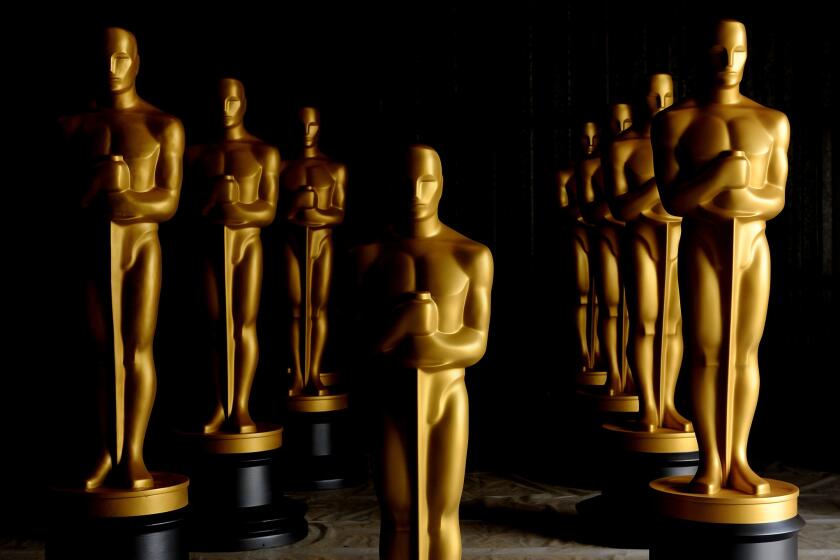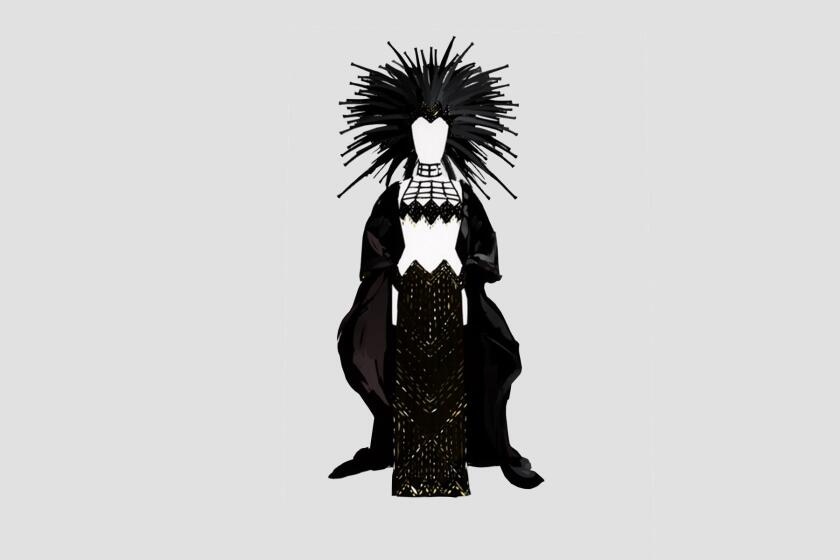Laura Dern, Greta Gerwig and other Oscar nominees on what true equality in Hollywood would look like
Days before the Academy Awards, Oscar nominee Laura Dern arrived at Diane von Furstenberg’s sprawling Beverly Crest estate for an intimate luncheon hosted by the fashion designer and the Academy Museum of Motion Pictures celebrating female nominees. If Dern felt fatigued from a flight from London, you’d never know it Wednesday thanks to her bright dress and cheery disposition.
“We’re all a little jet-lagged,” she said, having just returned home from Sunday’s British Academy Film Awards, where she won the supporting actress award for her performance in “Marriage Story.”
In addition to Dern and fellow Oscar nominee Greta Gerwig, attendees at the luncheon included Anita Hill, Quibi Chief Executive Meg Whitman, Miranda Kerr, Andie MacDowell and Dee Dee Myers as well as other nominees such as Amy Pascal, Jane Rosenthal, Arianne Phillips, Diane Warren, Jayne-Ann Tenggren, Julia Reichert, Karen Rupert Toliver, Kirstine Barfod, Krysty Wilson-Cairns, Nicki Ledermann, Shannon McIntosh and Waad al-Kateab.
The group sipped tea and had a buffet lunch that included Chilean sea bass, smoked trout and salmon caviar, with sorbet for dessert.
And they chatted about life, the film industry and more.
Dern, one of the nominees wearing DVF’s line, has been sweeping up this awards season, but the actress is already looking ahead. “There’s so much work to be done, and every year represents where the work needs to be done,” she said, mentioning that progress has been made in the world of sound and animation but acknowledged the industry’s lack of parity in the director’s chair.
“It remains glaring that there are very few women at the helm directing films,” Dern said. “I think there’s more emphasis put on how people are slighted, but that’s a very hard thing to say because people are slighted every year. There are incredible movies made every year, and people aren’t acknowledged for their work.
From where and how to watch the ceremony to who and what is nominated, here’s a complete guide to this weekend’s Academy Awards.
“When 100 women of the 300 movies made are female, and among those 100, women aren’t acknowledged for their work, it’s going to be a lot easier to focus on the accolade snubbing versus the industry,” Dern said, “But right now, we have to look at how few women there are getting to make movies and even more so — maybe you can write about this, because I haven’t [seen] anybody write about this — how few women are given a second chance.”
Dern said that throughout her career, she’s noticed an inequality in second chances, contributing to the larger issue at hand. “Every time I would work with an amazing female filmmaker, they’d say, ‘Yeah. You know, she tried to develop something, but she could never get it off the ground,’” Dern said.
Dern also acknowledged one of her favorite filmmakers who gave the “Marriage Story” actress her first lead in a film, Joyce Chopra, director of the 1985 movie “Smooth Talk,” as well as director Martha Coolidge of 1991’s “Rambling Rose,” a film that gave Dern her first Oscar nomination.
Dern’s sentiment about parity in the film industry was echoed by other guests at the luncheon, including “Little Women’s” Gerwig, who was shut out of the Academy Award’s all-male directors category.
However, “Little Women” has six Oscar nominations including best picture and Gerwig’s nod for adapted screenplay. “It’s an amazing honor,” she said. “I feel like this acknowledgment of the film as a whole is very meaningful for all of us. But it’s bittersweet, because I’ve loved this book since I was a girl. It’s the book that made me believe I could be a writer. It’s been boiling inside of me for years and years and years, and in some ways, it’s the end of my journey with this book. It’s like a 36-year journey that’s now over. So it’s sad in that way, but also, it’s OK. It doesn’t belong to me anymore. It never really did.”
As for making it in Hollywood, Gerwig said that careers have ebbs and flows and that taking big swings at bat also means there will be moments when someone strikes out and a film bombs.
“And so are you allowed to get another at bat?” she said. “And that’s the thing I think I’m most interested in in this moment, because there are so many immensely talented filmmakers. And I want to see their whole career.
Predicting the four acting races for the 2020 Oscars is easy this year, but there’s still drama in the best picture race and others
“I don’t just want to see the one, two or three that work,” she said. “I don’t want to see the industry bail on them. I want to see the industry reinvest, because I think we’ve shown what different male filmmakers [can produce over time]. ... I’m always amazed by how many people need to take a chance on you in order for you to even make one film. That’s an extraordinary thing that all these people put their faith in you, and it’s over years.”
Thompson, who cohosted the luncheon with the Academy of Motion Picture Arts and Sciences’ chief executive, Dawn Hudson, said she’s been having similar conversations with industry friends.
“I was just speaking about this with Eva Longoria,” she said. “We had a film [‘Sylvie’s Love’] that just got shown at Sundance, and we were talking about the ways in which men are allowed in some ways, historically in this industry, to fail upwards, and women aren’t awarded that chance. I’ve always said this, and some people like it less than others. But I’ve said, ‘To me, one mark of true equality is that we get to be mediocre every so often.’ I think the expectation of having to be exceptional just to be seen is really, really unfair. … I hope that’s something that’s shifting and changing.”
Thompson, whose top picks from the season were “Parasite,” “The Farewell,” “Portrait of a Lady on Fire” and “The Souvenir,” said progress is being made slowly but surely. “It is a banner year,” she said. “It is in terms of the amount of films that were made by women that were not only critically acclaimed [but] that did well at the box office. It’s been a year of really breaking those barriers. This time of year can become so awards centric, and to me, movies are little miracles, and I think they really have the ability to shape and shift culture.”
Experience standout Oscar dresses from the last five decades, including Farrah Fawcett’s disco dress and Billy Porter’s tuxedo gown, in augmented reality.
For her part, Von Furstenberg said the purpose of the afternoon was to foster a sense of community. “It’s about supporting each other,” she said. “When people asked me, ‘What do you want to be when you grow up?,’ I said, ‘I want to be a woman in charge.’ … Being in charge is first and foremost a commitment to yourself to own who you are, to be true to yourself, because that is how you become strong, and once you’re in charge, then it is your privilege or your duty to use your connections, your knowledge, your experience in order to help others.”
In the same spirit, Von Furstenberg will host the Feb. 19 DVF Awards in New York, which will honor U.S. Supreme Court Justice Ruth Bader Ginsburg with the Lifetime Leadership award in addition to various inspirational women doing nonprofit work.
“The whole point of having big names is so that you can give awards to people who don’t have a name,” said Von Furstenberg, who is also a board member for the Renzo Piano-designed Academy Museum, which will open this year at the corner of Wilshire Boulevard and Fairfax Avenue in Los Angeles. “You need the big names to make it more important so that you give exposure to people who do amazing work.”
Wallis Annenberg and Vanity Fair editor-in-chief Radhika Jones cohosted the exhibition at the Annenberg Space for Photography of 130 portraits, party photos and multimedia installations by more than 50 photographers.
Smriti Mundhra, who directed the Oscar-nominated short documentary “St. Louis Superman,” could hardly contain her excitement about the afternoon with her fellow nominees, Von Furstenberg and other guests. “I’m just looking around and seeing women that I’ve admired my entire career,” she said. “It feels a little bit like the nerd that got invited to sit at the cool kids’ table in high school. It’s certainly a little bit intimidating, but it’s such a welcoming environment.”
Mundhra acknowledged the film industry has had its challenges. “Honestly, it’s sometimes difficult for someone like me, a woman of color, to ever even dream about being here nominated for an Oscar at an event like this,” she said. “It’s not something I really ever allowed myself to dream about. I’m not one of those people who has a vision board with an Oscar on it or things like that. I decided early in my career that I was going to focus on trying to do good work and not stress about accolades or validation, because it doesn’t come that often.”
Underscoring Von Furstenberg’s point, Mundhra said she hopes to use her momentum to help others. “I want to use this access and this next step forward to bring more women, more people of color to the table,” she said. “I wish it wasn’t entirely our burden, but I feel like if we don’t do it, who’s going to do it for us?”
More to Read
Sign up for The Wild
We’ll help you find the best places to hike, bike and run, as well as the perfect silent spots for meditation and yoga.
You may occasionally receive promotional content from the Los Angeles Times.












